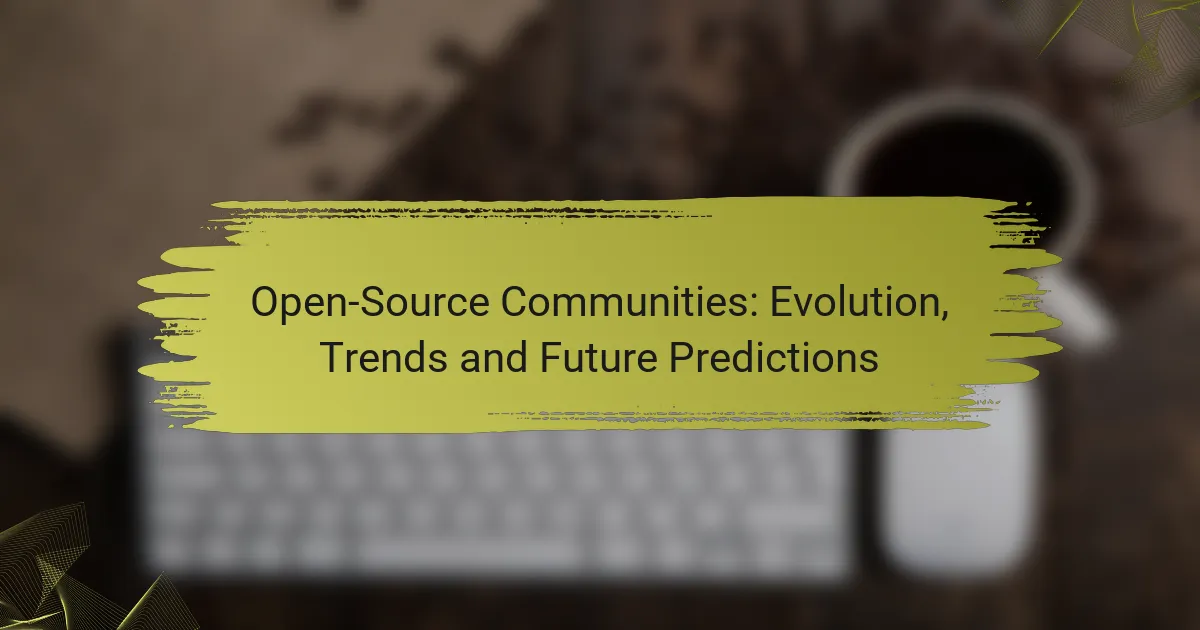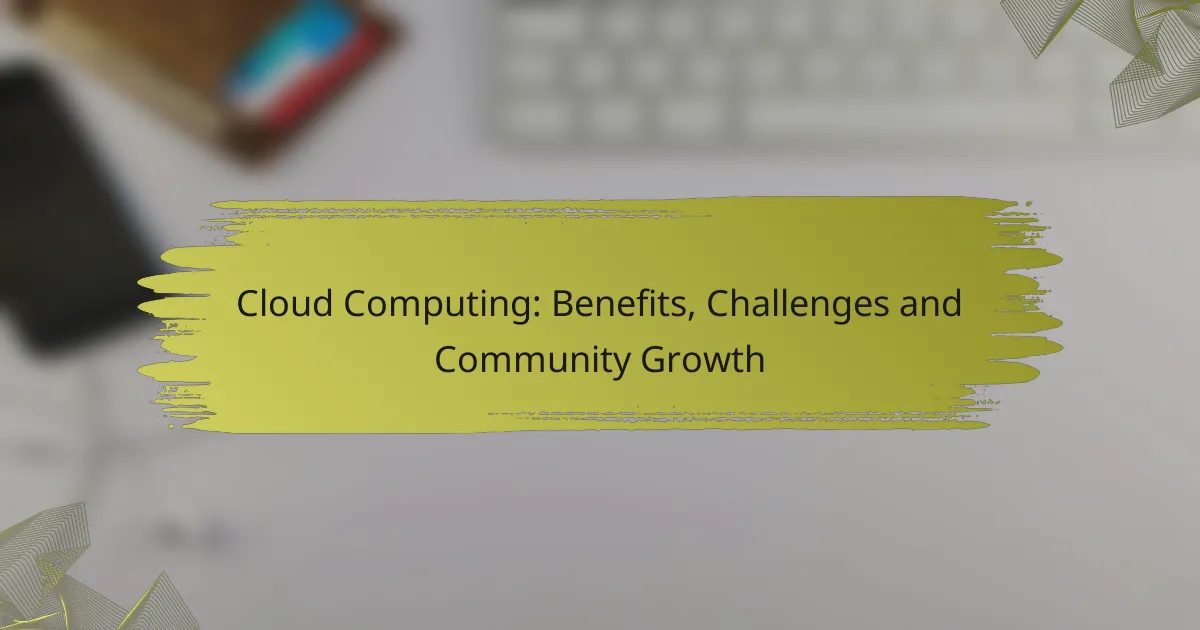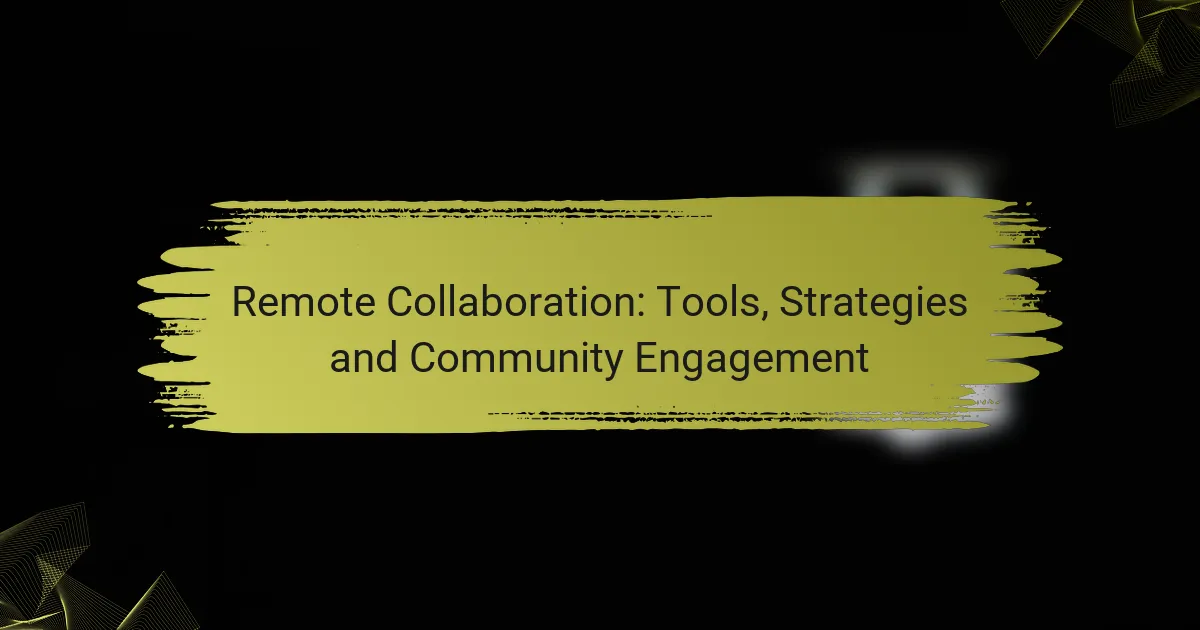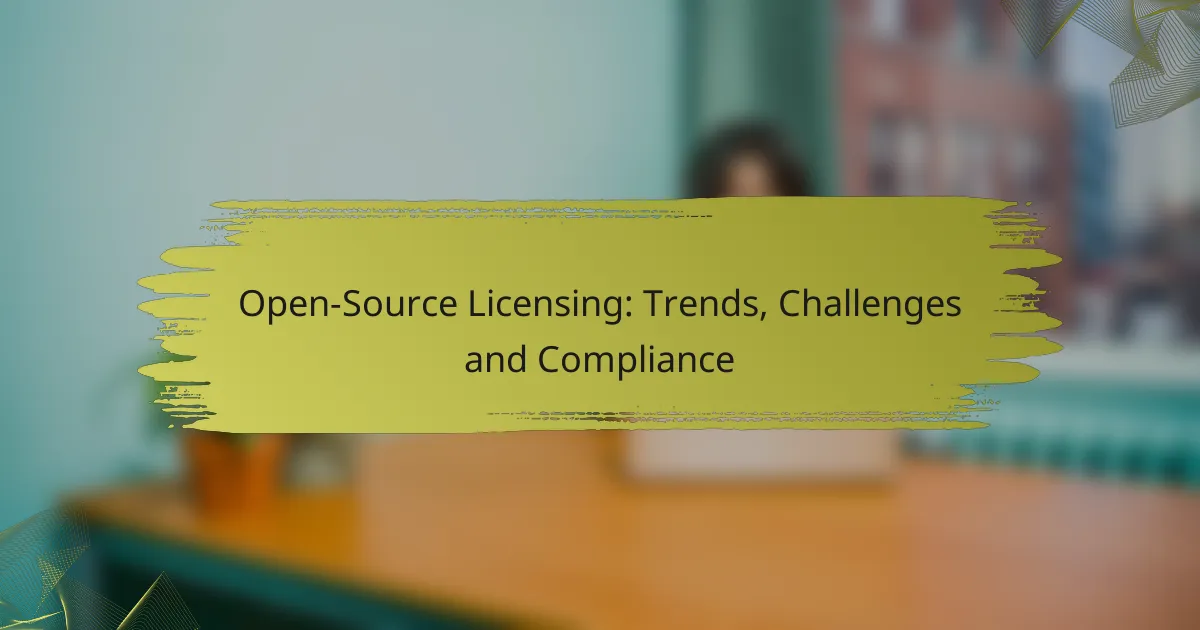Open-source communities have undergone a remarkable transformation, evolving from small developer groups into expansive and diverse ecosystems. This shift has been fueled by technological advancements and a growing emphasis on collaboration and inclusivity, which are reshaping project development and participation. As these communities continue to thrive, they play a crucial role in driving innovation and enhancing software through collective knowledge and problem-solving.
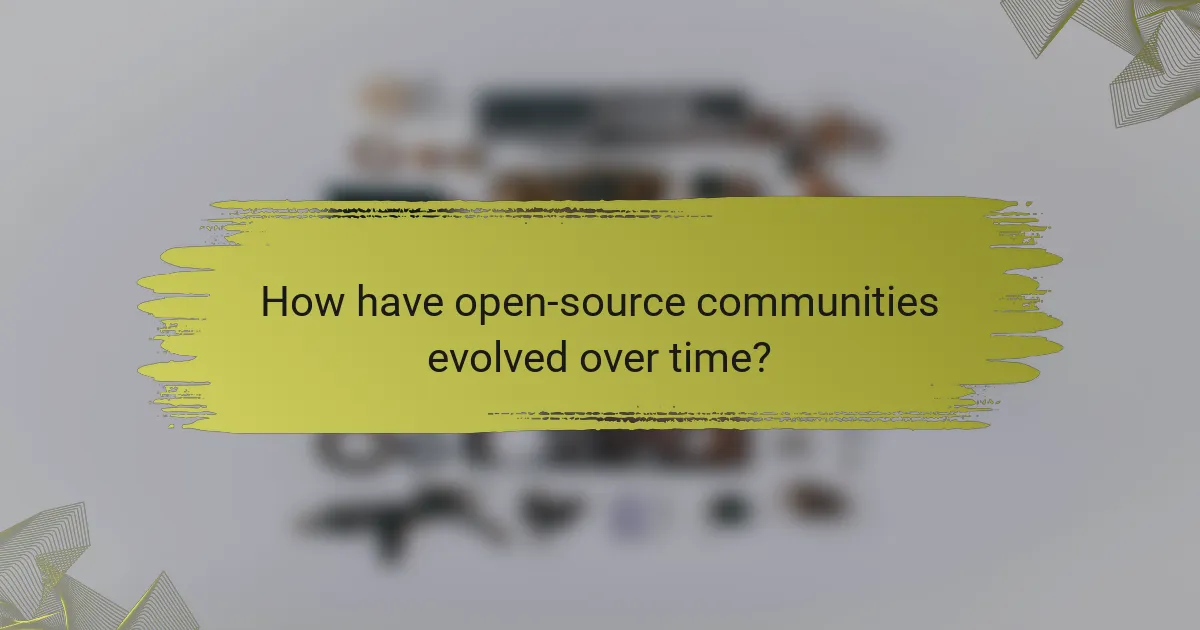
How have open-source communities evolved over time?
Open-source communities have transformed significantly, evolving from small groups of developers to large, diverse ecosystems. This evolution has been driven by technological advancements, increased collaboration, and a growing recognition of the value of shared resources.
Historical milestones in open-source
The open-source movement gained momentum in the 1980s with the establishment of the Free Software Foundation by Richard Stallman. Key milestones include the release of the Linux kernel in 1991, which catalyzed widespread adoption and collaboration. The introduction of the Open Source Initiative in 1998 further formalized the movement, promoting open-source software as a viable alternative to proprietary solutions.
In the 2000s, platforms like GitHub emerged, revolutionizing how developers collaborate on projects. This shift allowed for easier version control and community engagement, leading to an explosion of open-source projects across various domains.
Key figures in open-source development
Prominent figures have shaped the open-source landscape, including Linus Torvalds, who created the Linux kernel, and Eric S. Raymond, known for his advocacy and writings on open-source philosophy. Their contributions have inspired countless developers and fostered a culture of collaboration and innovation.
Additionally, many organizations and foundations, such as the Apache Software Foundation and Mozilla, have played crucial roles in supporting open-source projects and communities, providing resources and governance structures that facilitate growth and sustainability.
Impact of licensing changes
Licensing has been a pivotal factor in the evolution of open-source communities. The introduction of licenses like the GNU General Public License (GPL) and the MIT License has defined how software can be used, modified, and distributed. These licenses encourage collaboration while protecting the rights of developers.
Recent trends show a shift towards more permissive licenses, which allow for greater flexibility in commercial applications. This change has attracted more businesses to engage with open-source projects, leading to increased funding and resources for community-driven initiatives.
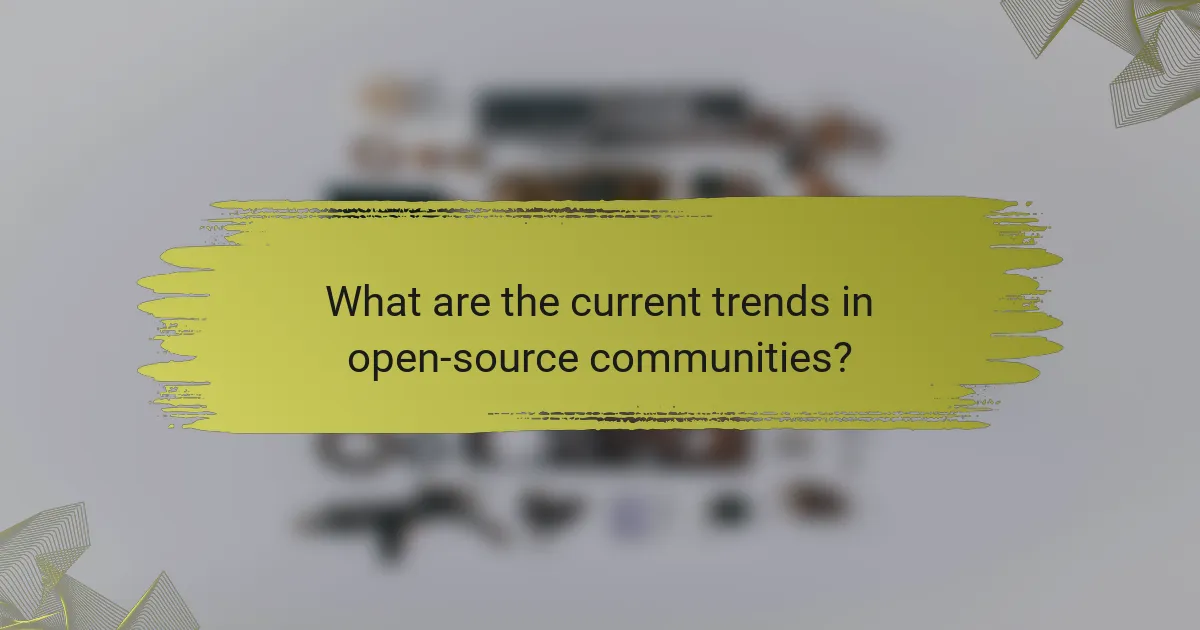
What are the current trends in open-source communities?
Current trends in open-source communities highlight a shift towards collaboration, corporate involvement, and inclusivity. These trends are shaping how projects are developed and who participates in them, ultimately influencing the future of open-source software.
Rise of collaborative platforms like GitHub
Collaborative platforms such as GitHub have transformed how developers contribute to open-source projects. These platforms provide tools for version control, issue tracking, and community engagement, making it easier for individuals to collaborate regardless of their geographical location.
As a result, many projects have seen increased contributions, with thousands of developers working together on a single repository. This model encourages innovation and rapid development, as contributors can easily share ideas and code.
Increased corporate sponsorship and support
Many companies are recognizing the value of open-source software and are increasingly sponsoring projects and contributors. This support can take the form of financial contributions, resources, or even dedicated staff time for open-source initiatives.
Corporate sponsorship not only helps sustain projects but also fosters a sense of community and shared responsibility. Companies like Google, Microsoft, and Red Hat have established programs to support open-source development, which can lead to better software and enhanced collaboration.
Focus on diversity and inclusion initiatives
Diversity and inclusion are becoming central themes in open-source communities. Efforts are being made to create welcoming environments for underrepresented groups, including women, people of color, and individuals from various backgrounds.
Initiatives such as mentorship programs, diversity scholarships, and inclusive coding events aim to broaden participation. By fostering a diverse community, open-source projects can benefit from a wider range of perspectives and ideas, ultimately leading to more robust and innovative solutions.
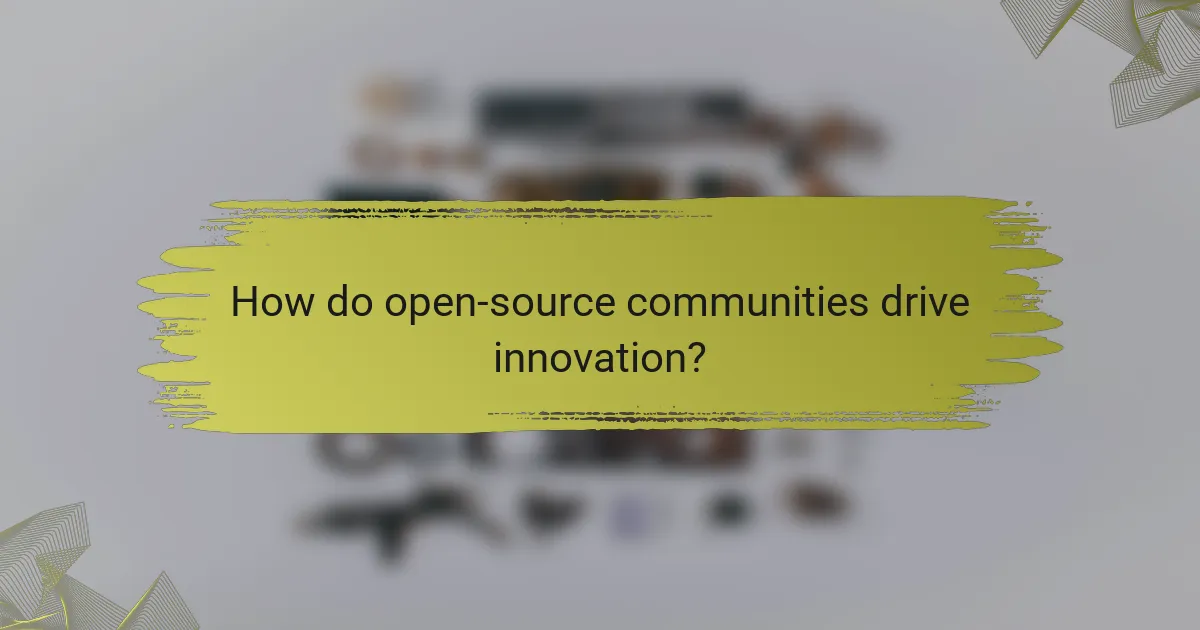
How do open-source communities drive innovation?
Open-source communities drive innovation by fostering collaboration and sharing knowledge among developers and users. This collective effort leads to rapid problem-solving, diverse perspectives, and the continuous improvement of software projects.
Examples of successful open-source projects
Notable examples of successful open-source projects include the Linux operating system, the Apache HTTP Server, and the Mozilla Firefox web browser. Each of these projects has significantly impacted their respective fields, demonstrating the power of community-driven development.
Other successful projects like Kubernetes and TensorFlow have transformed cloud computing and machine learning, respectively. These examples highlight how open-source initiatives can lead to widespread adoption and innovation across various industries.
Community-driven feature development
Community-driven feature development allows users to propose and prioritize new functionalities based on real-world needs. This approach ensures that the software evolves in ways that are directly beneficial to its users, fostering a sense of ownership and engagement within the community.
For instance, platforms like GitHub enable developers to submit feature requests and contribute code, which can be reviewed and integrated by maintainers. This collaborative process can lead to faster development cycles and more relevant features.
Case studies of industry adoption
Many industries have successfully adopted open-source solutions, demonstrating their viability and effectiveness. For example, companies like Netflix and Spotify leverage open-source technologies to enhance their infrastructure and improve service delivery.
Another case is the adoption of the OpenStack cloud platform by organizations looking to build scalable cloud environments. These case studies illustrate how open-source projects can meet complex industry demands while promoting innovation and cost-effectiveness.
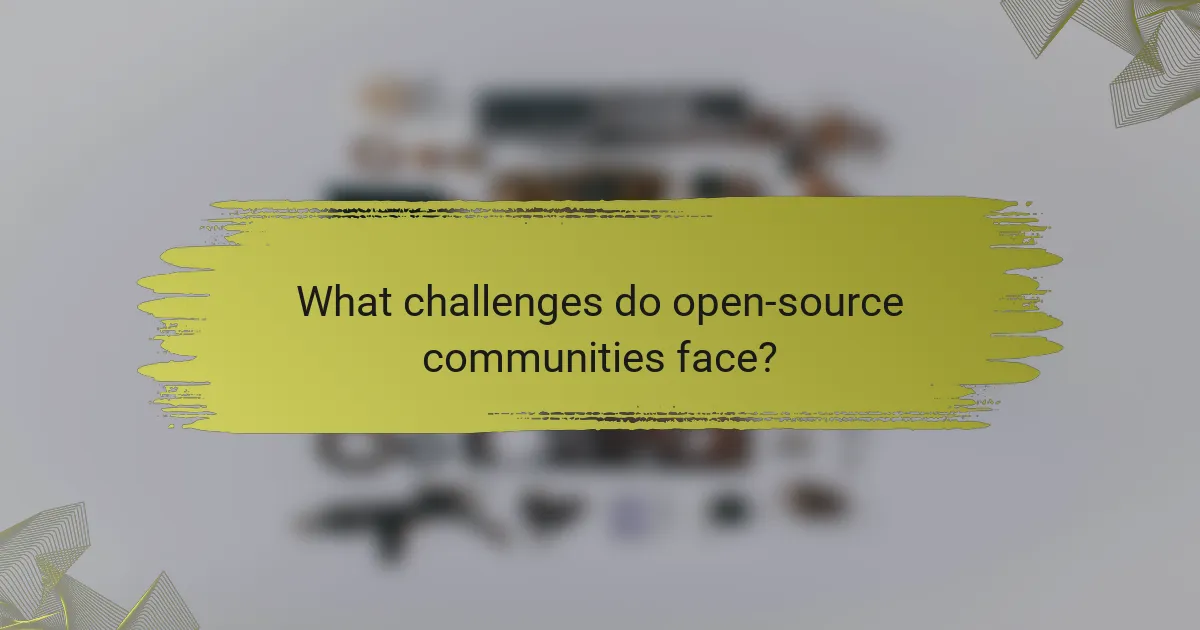
What challenges do open-source communities face?
Open-source communities encounter several significant challenges that can hinder their growth and sustainability. Key issues include securing funding, maintaining effective governance, and addressing security vulnerabilities within projects.
Sustainability and funding issues
Sustainability is a major concern for open-source communities, as many projects rely on voluntary contributions and donations. Without a steady stream of funding, projects may struggle to maintain development and support.
Communities can explore various funding models, such as crowdfunding, sponsorships, or grants from organizations interested in their projects. Establishing a clear budget and financial transparency can also attract more contributors and sponsors.
Maintaining project governance
Effective governance is crucial for the longevity of open-source projects. Clear decision-making processes and roles help prevent conflicts and ensure that contributions are managed efficiently.
Communities should consider adopting established governance models, such as meritocratic or democratic systems, to enhance participation and accountability. Regular meetings and open discussions can foster a collaborative environment and keep contributors engaged.
Addressing security vulnerabilities
Security vulnerabilities pose a significant risk to open-source projects, as they can lead to data breaches and loss of user trust. Communities must prioritize identifying and addressing these vulnerabilities promptly.
Implementing regular security audits and encouraging a culture of responsible disclosure can help mitigate risks. Additionally, providing clear guidelines for contributors on secure coding practices can enhance overall project security.
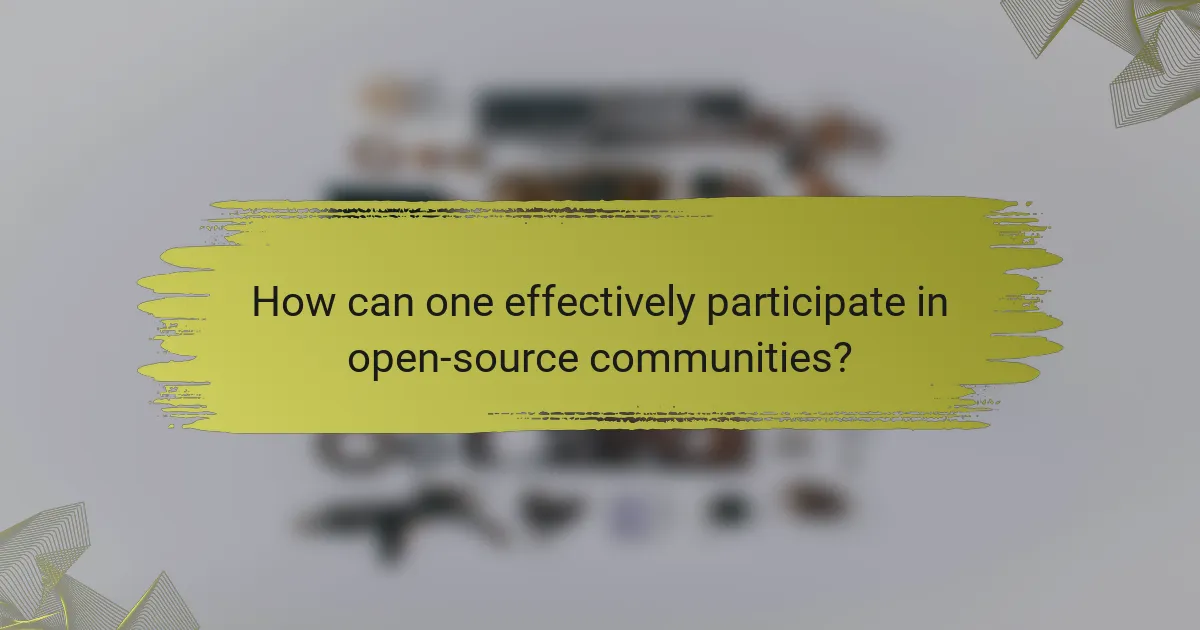
How can one effectively participate in open-source communities?
To effectively participate in open-source communities, engage actively by contributing code, documentation, or support while collaborating respectfully with others. Understanding project guidelines and community culture is essential for meaningful involvement.
Steps to contribute to projects
Begin by identifying a project that aligns with your interests and skills. Review the project’s documentation, including contribution guidelines, to understand how to get started. Start with small tasks, such as fixing bugs or improving documentation, to familiarize yourself with the codebase.
Once comfortable, you can submit your contributions through pull requests. Ensure your code is well-tested and adheres to the project’s coding standards. Engage with project maintainers for feedback and be open to making adjustments based on their suggestions.
Best practices for collaboration
Effective collaboration in open-source communities hinges on clear communication. Use project forums, chat channels, or issue trackers to discuss ideas and seek help. Always be respectful and constructive in your interactions.
Document your contributions and decisions to keep everyone informed. Regularly update your progress and be proactive in addressing any issues that arise. Remember to acknowledge the contributions of others to foster a positive community atmosphere.
Resources for new contributors
New contributors can benefit from various resources to enhance their participation in open-source projects. Websites like GitHub and GitLab offer extensive documentation on version control and collaboration practices. Additionally, platforms like Open Source Guides provide valuable insights into getting started.
Consider joining online communities such as Discord or Slack channels dedicated to open-source projects, where you can ask questions and share experiences. Participating in events like hackathons or open-source sprints can also provide hands-on learning opportunities and help you connect with other contributors.

What are the future predictions for open-source communities?
Future predictions for open-source communities suggest continued growth, increased collaboration, and a shift towards more sustainable funding models. As technology evolves, these communities are likely to adapt by embracing new tools and methodologies to enhance participation and innovation.
Increased Collaboration Across Industries
Open-source communities are expected to see heightened collaboration across various industries, including healthcare, finance, and education. This trend will facilitate the sharing of best practices and resources, leading to faster innovation cycles and improved software solutions.
For instance, healthcare organizations may collaborate on open-source projects to develop software that enhances patient care while ensuring compliance with regulations like HIPAA. Such partnerships can drive efficiency and reduce costs.
Focus on Sustainability and Funding
As open-source projects mature, there will be a stronger emphasis on sustainability and diverse funding sources. Communities may explore models like sponsorships, grants, and crowdfunding to ensure long-term viability.
For example, platforms like GitHub Sponsors allow developers to receive direct financial support from users and organizations, fostering a more sustainable ecosystem. This shift will help maintain project momentum and attract new contributors.
Adoption of New Technologies
The future of open-source communities will likely involve the adoption of emerging technologies such as artificial intelligence, blockchain, and cloud computing. These technologies can enhance collaboration and streamline project management.
For instance, AI tools can automate code reviews and testing processes, allowing contributors to focus on more complex tasks. This can lead to higher quality software and faster delivery times.
Greater Emphasis on Inclusivity and Diversity
Open-source communities are predicted to prioritize inclusivity and diversity, recognizing that varied perspectives lead to better outcomes. Efforts to create welcoming environments for underrepresented groups will be crucial for attracting new talent.
Initiatives such as mentorship programs and diversity scholarships can help bridge the gap and encourage participation from a broader range of individuals. This focus will enrich the community and enhance innovation.
